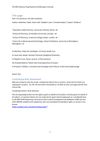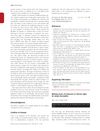83 citations,
August 2020 in “Resources” Macroalgae compounds offer sustainable, effective benefits for cosmetics.
 2 citations,
February 2022 in “BMJ”
2 citations,
February 2022 in “BMJ” Emollients can make fabrics more flammable, so take safety precautions.
 1 citations,
March 2023 in “Frontiers in Cardiovascular Medicine”
1 citations,
March 2023 in “Frontiers in Cardiovascular Medicine” A specific gene variant is linked to heart disease, increased heart muscle, curly hair, and thick skin on palms and soles.
 April 2023 in “Journal of Investigative Dermatology”
April 2023 in “Journal of Investigative Dermatology” An oil-in-water emulsion with CBD and ginger root extract significantly improved symptoms of dry and eczema-prone skin.
 March 2014 in “Journal of The American Academy of Dermatology”
March 2014 in “Journal of The American Academy of Dermatology” Azathioprine may be an effective treatment for severe hair loss.
 1 citations,
July 2022 in “International Journal of Environmental Research and Public Health”
1 citations,
July 2022 in “International Journal of Environmental Research and Public Health” In Poland, people search more for certain skin conditions depending on the season, and despite more STD infections, searches for them have decreased, suggesting a need for better sexual education.
 November 2017 in “British Journal of Dermatology”
November 2017 in “British Journal of Dermatology” The electronic version of the Dermatology Life Quality Index is as effective as the paper version, with most patients preferring it.
 March 2014 in “Journal of The American Academy of Dermatology”
March 2014 in “Journal of The American Academy of Dermatology” Azathioprine treatment led to rapid hair regrowth in a woman with alopecia universalis.
 610 citations,
April 2014 in “Nature Reviews Immunology”
610 citations,
April 2014 in “Nature Reviews Immunology” The document concludes that understanding how the skin's immune system and inflammation work is complex and requires more research to improve treatments for skin diseases.
 31 citations,
July 2017 in “Journal of the American Academy of Dermatology”
31 citations,
July 2017 in “Journal of the American Academy of Dermatology” Apremilast improved symptoms in patients with severe skin conditions.
 January 2024 in “bioRxiv (Cold Spring Harbor Laboratory)”
January 2024 in “bioRxiv (Cold Spring Harbor Laboratory)” A specific enzyme is essential for proper hair follicle stem cell development and healthy skin.
 4 citations,
January 2019 in “Einstein (São Paulo)”
4 citations,
January 2019 in “Einstein (São Paulo)” Dupilumab improved severe atopic dermatitis in a patient who didn't respond to other treatments.
 124 citations,
October 2019 in “Frontiers in Immunology”
124 citations,
October 2019 in “Frontiers in Immunology” Janus kinase inhibitors are promising treatments for autoimmune skin diseases like eczema and psoriasis.
25 citations,
May 2019 in “Biologics” Dupilumab can cause rare side effects like a rash on the face and neck.
1 citations,
June 2023 in “Journal of Patchouli and Essential Oil Products” Patchouli essential oil may help reduce eczema symptoms in infants and toddlers.
 50 citations,
March 2021 in “Journal of investigational allergology & clinical immunology”
50 citations,
March 2021 in “Journal of investigational allergology & clinical immunology” Dupilumab is being tested for many new skin, respiratory, and gastrointestinal conditions.
 1 citations,
October 2021 in “Cureus”
1 citations,
October 2021 in “Cureus” Platelet-rich plasma treatment may safely and effectively reduce skin lesions in psoriasis and atopic dermatitis.
 13 citations,
April 2017 in “Journal of Alternative and Complementary Medicine”
13 citations,
April 2017 in “Journal of Alternative and Complementary Medicine” Traditional and complementary medicine may help with skin conditions, but more high-quality research is needed.
 August 2023 in “Clinical and experimental dermatology and therapies”
August 2023 in “Clinical and experimental dermatology and therapies” Dupilumab may help hair regrowth in some patients with severe atopic dermatitis, but results vary.
 21 citations,
January 1988 in “Stress Medicine”
21 citations,
January 1988 in “Stress Medicine” Stress affects skin health and emotional well-being should be considered in skin disease treatment.
 32 citations,
January 2012 in “International Journal of Dermatology”
32 citations,
January 2012 in “International Journal of Dermatology” Skin side effects from EGFR inhibitor cancer treatment can be managed effectively, often without stopping the medication.
14 citations,
September 2021 in “Journal of Inflammation Research” Alopecia areata patients, especially women with nail issues or atopic diseases, are at higher risk for other autoimmune diseases.
 3 citations,
August 2021 in “Cutis”
3 citations,
August 2021 in “Cutis” Some alternative medicine treatments might work for skin conditions, but their effectiveness and safety differ a lot.
 65 citations,
January 2009 in “Pediatric Dermatology”
65 citations,
January 2009 in “Pediatric Dermatology” The most common skin problems in Indian children are infections and eczemas.
 27 citations,
March 2018 in “Allergy and asthma proceedings”
27 citations,
March 2018 in “Allergy and asthma proceedings” People with alopecia areata often have higher rates of allergies and autoimmune diseases.
 6 citations,
February 2023 in “Advances in Therapy”
6 citations,
February 2023 in “Advances in Therapy” Baricitinib, a drug for rheumatoid arthritis, atopic dermatitis, and alopecia areata, is generally safe with low risk of major side effects, even in patients with risk factors. It's also effective in promoting hair regrowth in alopecia areata patients.
 3 citations,
October 2022 in “Frontiers in Surgery”
3 citations,
October 2022 in “Frontiers in Surgery” Proteomics combined with other technologies can lead to a better understanding of skin diseases.
142 citations,
March 2019 in “Molecules/Molecules online/Molecules annual” Cannabinoids may help treat various skin conditions.
 59 citations,
June 2022 in “Frontiers in medicine”
59 citations,
June 2022 in “Frontiers in medicine” There are still challenges in diagnosing and treating chronic skin diseases, but there is hope for future improvements.
 November 2017 in “British Journal of Dermatology”
November 2017 in “British Journal of Dermatology” Genes controlling hair growth and immune response are disrupted in male pattern baldness.
























